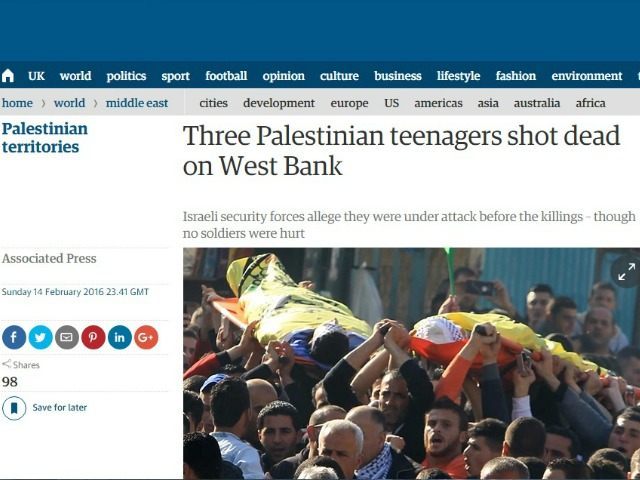The Guardian has admitted that some of its headlines reporting on the conflict between Palestinians and Israel have been “oversimplified”, but has rejected accusations of “bias”. It claims the headlines, which some pro-Israel activists have claimed are misleading, are simply a hang-over from the days of print journalism.
In recent months The Guardian, along with other news outlets, has come under increasing fire from campaigners who insist that headlines which report the deaths of Palestinians without making reference to the fact that they were terrorists are misleading.
Guardian revises highly inappropriate terror headline: Yesterday we commented on an extre… https://t.co/k0Nl9pTgpV #israel #media #bias
— AntisemitismNL (@AntisemitismNL) February 4, 2016
In an op-ed in today’s (Monday’s) Guardian, the paper’s Readers Editor, Chris Elliott has addressed just one of those complaints, which came from Yiftah Curiel, the press attache at London’s Israeli Embassy.
Mr Elliott explains that Mr Curiel wrote to his paper to complain that, too often “headlines of news pieces on the Israeli-Palestinian conflict will turn events on their head, portraying perpetrator as victim.”
Mr Curiel apparently cited one example, which Mr Elliott has focussed on: an Associated Press article which the Guardian ran under the headline “Three Palestinian teenagers shot dead on West Bank”. The subheading read: “Israeli security forces allege they were under attack before the killings – though no soldiers were hurt.”
Mr Curiel wrote to request that the headline be changed, because, as he put it: “The headline obscures the relevant and pressing fact that the youths themselves had opened fire at Israeli soldiers, while the headline basically insinuates that they were executed by the soldiers.”
He later added: “In fact, the sub headline in this case makes it even worse, almost insinuating that the soldiers were lying about being … as if the fact that they weren’t hurt somehow undermines the veracity of the attack.”
In his response, Mr Elliott wrote: “I rejected the complaint because the headline is not inaccurate, nor in my view does it suggest that the three Palestinians were innocent victims. Three Palestinians are dead.
However, he does admit that the headline is misleading in an era of internet-based media, adding: “But is it the whole story, no. Should headlines encapsulate the whole story? Traditionally they were required to capture the readers’ attention with the most significant part of the story: in this case the deaths. It was accepted that headlines were read in conjunction with the subheading and the article, which gave context.
“A headline on the web may be the only thing a reader sees.”
He also admits that the sub-heading is “problematic”, saying that it is one of three which has prompted the Guardian to issue new guidelines on giving greater context and “tell as much of the story as possible, especially where Palestinians are killed when attacking people.”
But he insists that the example is not evidence of institutional bias within the left-wing press.
.@Guardian headline again reveals their instituional bias against the Jewish state. #Israel #terror https://t.co/6M5JxBNB1s
— UK Media Watch (@UKMediaWatch) October 9, 2015
In making his case against institutional bias, he in turn accuses the Israeli government of “a background campaign by Israel to challenge the media’s reporting on the attacks, particularly by foreign media,” citing the recent Knesset sub-committee session on foreign media coverage.
He quotes Reuters Jerusalem Bureau Chief Luke Baker, head of the The Foreign Press Association in Jerusalem, who told the committee: “we disagree with the premise of the hearing – it presupposes two things: that the foreign media are biased and that that supposed bias undermines Israel’s ability to quell terrorist attacks. We do not agree that the foreign media are biased, and the legitimacy of Israel’s campaign against terrorism is entirely determined by how Israel conducts that campaign.”
He continued: “Mistakes are made in all professions. Isolated mistakes – and given the vast coverage of this story, they are extremely isolated – do not constitute institutional bias.”
Elliott adds “It is also worth noting that editors and subeditors writing headlines for an agency report of an event a few hours old are cautious because the circumstances of many of these killings are disputed, certainly in the immediate aftermath.”
But UK Media Watch, a watchdog which bills itself as “promoting fair and accurate coverage of Israel,” has said that the Elliott’s article “misses the mark,” adding “the problem of media bias against is far greater than ‘a few’ misleading headlines alone.”
@LukeReuters Outstanding research uncovering documents hidden on our own website! Must be a slow news day
— Tamar Sternthal (@TamarSternthal) February 16, 2016
They highlight a recent op-ed by colleague and Director of the Israel office of the Committee for Accuracy in Middle East Reporting in America (CAMERA), Tamar Sternthal, who also gave evidence to the Knesset sub-committee, and who has pointed out that criticism of the media is essential in a free democratic state.
“Apparently, [Economist journalist Anshel] Pfeffer, Baker and some of their colleagues fail to understand that critics of journalists are every bit as vital to democracy as journalists. The alternative is the media policing itself. And that’s something that Baker has proven that he can’t — or won’t — do,” she said.

COMMENTS
Please let us know if you're having issues with commenting.